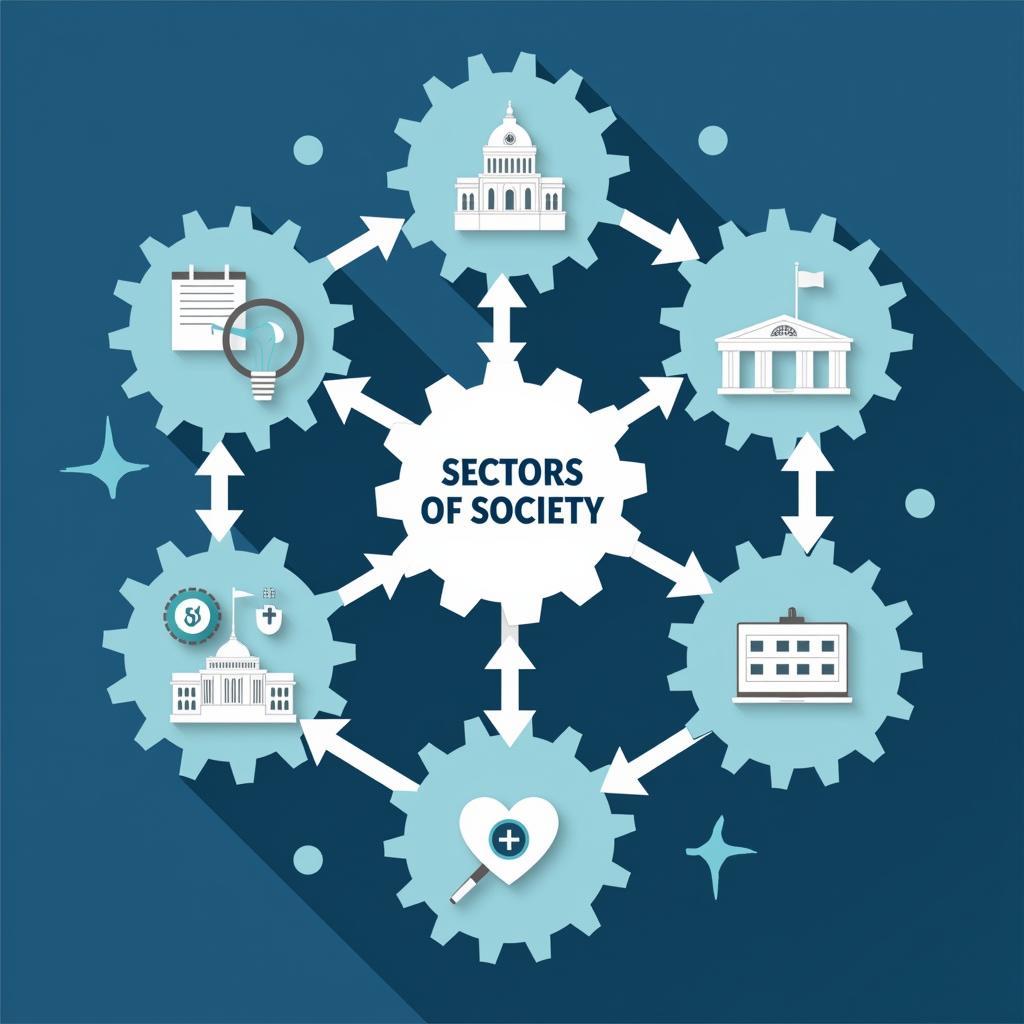Sectors Of Society form the very fabric of our shared human experience. They are the diverse groups and institutions that shape our lives, influence our perspectives, and contribute to the overall functioning of communities and nations. Understanding these sectors, their interconnectedness, and their unique contributions is essential for fostering peace and collaboration in an increasingly complex world. Just like a tapestry woven with different colored threads, each sector adds its own unique pattern to create the bigger picture of our global society. This understanding is crucial for building bridges between different groups, promoting empathy, and working towards a more peaceful and harmonious future.
 The Interconnectedness of Sectors in Society
The Interconnectedness of Sectors in Society
What are the Sectors of Society and Why are They Important for Peace?
Sectors of society can be broadly categorized into various groups, each playing a vital role in shaping the social, economic, and political landscape. These include the government sector, responsible for governance and policy-making; the business sector, driving economic activity and innovation; the non-profit sector, addressing social needs and advocating for positive change; the education sector, nurturing future generations and fostering critical thinking; the media sector, shaping public opinion and disseminating information; and the religious sector, providing spiritual guidance and moral frameworks. Each of these sectors interacts with and influences the others, creating a complex web of relationships. When these sectors work together harmoniously, they contribute to a stable and thriving society. However, when conflicts arise between sectors, it can lead to social unrest and instability. Understanding the dynamics between these sectors is therefore critical for peacebuilding efforts. For instance, the new circle society aims to bridge the gap between different communities.
How Can We Foster Collaboration Between Different Sectors?
Building bridges between different sectors requires open communication, mutual understanding, and a willingness to collaborate. This involves creating platforms for dialogue, where representatives from different sectors can share their perspectives, identify common ground, and work towards shared goals. It also requires fostering a culture of respect and empathy, where individuals appreciate the unique contributions of each sector and recognize their interconnectedness.
The Role of Education in Promoting Inter-Sectoral Understanding
Education plays a crucial role in shaping individuals’ understanding of the sectors of society and their interconnectedness. By incorporating interdisciplinary perspectives and promoting critical thinking, education can empower individuals to navigate the complexities of societal structures and contribute to building a more peaceful and just world. Initiatives like the public relations student society of america can further enhance this understanding by promoting effective communication and fostering mutual respect between different groups.
How can sectors of society contribute to peace?
Each sector can contribute uniquely to peace. The business sector can create economic opportunities, reducing poverty and promoting stability. The government sector can implement policies that promote justice and equality. Civil society organizations can empower marginalized communities and advocate for peace. Recognizing these contributions and encouraging collaboration is key to building a more peaceful world. Groups like the ppe society demonstrate the power of focused study and action in contributing to societal betterment.
The Zero Marginal Cost Society and its Impact on Sectors
The concept of a the zero marginal cost society has significant implications for the various sectors of society. As technology advances and the cost of production decreases, it could potentially disrupt traditional economic models and create new opportunities for collaboration and innovation. Understanding these changes and their potential impact is essential for navigating the evolving landscape of our interconnected world.
Conclusion
Understanding the sectors of society is not just an academic exercise; it is a vital step towards building a more peaceful and harmonious world. By recognizing the interconnectedness of these sectors and fostering collaboration between them, we can create a more equitable, just, and sustainable future for all. We need to encourage dialogues, build bridges, and work together to create a world where every sector contributes to the common good and peace prevails. Let’s work towards a future where understanding and cooperation are the cornerstones of our global society. Consider the impact of organizations like society’s assets racine wisconsin on local communities.
When you need support, please contact Phone Number: 02043854663, Email: [email protected] Or visit: Khu 34, Bac Giang, 260000, Vietnam. We have a 24/7 customer support team.